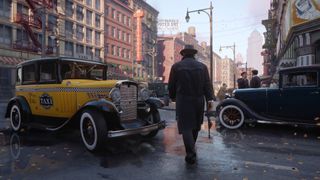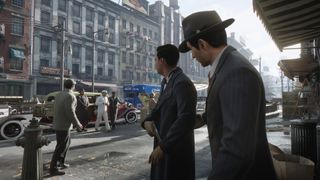Mafia: Definitive Edition is a fine remake of an open-world classic
Opinion: If you like story-driven open-world games, this is a treat

I'd like to think there's a parallel universe where Mafia became as big as GTA. 2002's Mafia: The City of Lost Heaven was a PC classic with a gorgeous period setting, but it never quite took off on consoles after a poorly-received PS2/Xbox port. Now, almost two decades later, Mafia 3 developer Hangar 13 has remade the original game for a generous budget price ($39.99/£34.99) on PC, PS4 and Xbox One.
In Mafia, you play Tommy Angelo, a cab driver who's in the wrong place at the wrong time when a couple of crime syndicate lieutenants – Sam and Paulie – jump into his car during a getaway. Since the Great Depression has left him deprived of other opportunities in the city of Lost Heaven, Tommy is drawn to mafia life and begins performing all kinds of heinous acts in the name of crime boss Don Salieri.
Mafia is a third-person shooter driven by its story, one which riffs on a number of classic movies about the subject without precisely replicating any of them – similar to the Red Dead series' relationship with the Western genre. While it's technically an open-world game, the city of Lost Heaven is more of an elaborate movie set than a GTA-style playground, functioning as a fancy backdrop to a confident narrative-focused experience. That said, a Free Ride mode unlocked early in the game lets players treat it more like a traditional sandbox.
Mafia: Definitive Edition is a remake of a 2002 classic that feels like a game from 2010, even though it looks like a modern blockbuster. This isn't a bad thing – it's just that Mafia has a lot in common with the kinds of linear third-person cover shooters that emerged in the post-Gears of War era, a type of game that's far less trendy these days.
The original Mafia predated Gears, so it didn't have a cover system – this remake does. There are many other sensible changes besides. The script has been completely rewritten, and the voice acting re-recorded with a new cast. The 2002 game was rock-hard, with police who chased you down for simply breaking the speed limit. Here, you can set the exact parameters of how harsh they are if you're only interested in the story, and enjoy quality-of-life improvements like skipping non-essential driving sections.
The right kind of remake

Mafia is pleasingly uncomplicated: you shoot your way through a whole bunch of set piece-heavy missions that follow the arc of the original game. You'll gun down rival goons in a church, on a cruise liner and in a bank, among other lavishly-rendered locations. Well-acted cutscenes break it all up – while the original game looks like it's acted by Thunderbirds puppets by today's standards (though for the time it was fantastic), the presentation of the story in Mafia: Definitive Edition makes it feel convincingly cinematic.
If the objective of this remake was to have it cohere with the rest of the trilogy, it's very successful. I remember Mafia being one of the first games to wow me with its writing, particularly in its memorable ending. This is faithful to the original's arc and themes, but more dense with dialogue and characterization. It makes each of its leading men seem trapped, melancholy and fallible in their own ways. Unusually for a shooter, the story is the real reason to play – this is something Mafia: Definitive Edition has in common with its source material.
Get daily insight, inspiration and deals in your inbox
Get the hottest deals available in your inbox plus news, reviews, opinion, analysis and more from the TechRadar team.
It's also not that long. I finished this in roughly 16 hours, which I was very happy with – Mafia has one story to tell and doesn't waste any of your time in telling it. I've become averse to big-budget games that threaten to monopolize your spare time with bloated storytelling and too many missions. Maybe it's not trendy to make a blockbuster-level singleplayer game with a campaign under 20 hours long in 2020, but this is something I actually miss about games from 10 or so years ago.
My only issue with this new version of Mafia is aiming and shooting. While the feel and sound of the old guns in your arsenal is terrific, particularly the brutally loud bolt action rifle, the reticule doesn't quite offer the level of accuracy that I'd like. The Tommy gun is never my weapon of choice, for example, because it sprays bullets so wide that it's almost never that useful.
Will new players like Mafia?

I don't have any other gripes, really, though I do wonder if new players will see the same value in Mafia: Definitive Edition that I do. I can't entirely remove the context of how I originally experienced Mafia: taking turns to play it with my friend Donald when we were both teenagers, enjoying it on his dad's then-expensive Pentium 4 computer while eating frankfurters for lunch (you'll have to pardon the excessively granular detail on a sandwich I ate 18 years ago). That specific playthrough left me with a lot of good memories, which enhanced my enjoyment of this remake.
If you're of a similar age now and you can play Apex Legends, Rocket League, Destiny 2 or Fortnite for free, I doubt Mafia: Definitive Edition seems that interesting to you. But if you're a fan of GTA's singleplayer campaigns, and you've been waiting years and years for Rockstar to make another one, this shares some DNA for sure. This game has plenty of large-scale gunfights, inventive set pieces and car chases – even if the 1930s setting means most of those vehicles are slow as hell.
Mafia: Definitive Edition is a remake driven by a similar approach to 2019's Resident Evil 2. It's faithful in the ways that matter, but otherwise fills in the gaps in your memory with carefully-considered additions. If you played the original, I think this is a slam dunk nostalgia trip, especially for the price. If you're new to Mafia, the Definitive Edition is part of a trilogy collection that costs the same as one regular new game – if you like this first installment, the second is pretty great too.
Samuel is a PR Manager at game developer Frontier. Formerly TechRadar's Senior Entertainment Editor, he's an expert in Marvel, Star Wars, Netflix shows and general streaming stuff. Before his stint at TechRadar, he spent six years at PC Gamer. Samuel is also the co-host of the popular Back Page podcast, in which he details the trials and tribulations of being a games magazine editor – and attempts to justify his impulsive eBay games buying binges.
Most Popular



